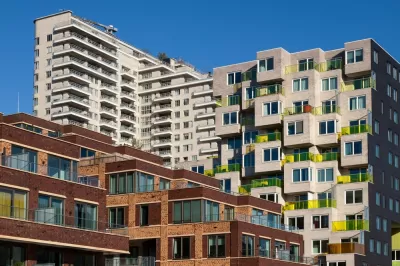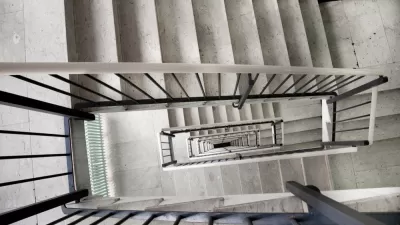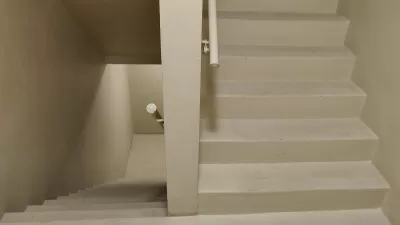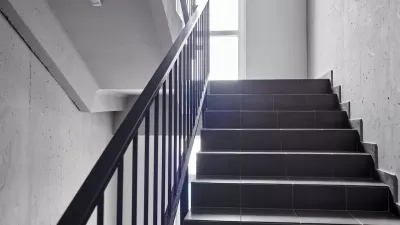One writer argues that single-staircase buildings solve an architectural problem and make buildings more interesting, but the political problem of the U.S. housing crisis goes much deeper.

The single-staircase building, prohibited in many U.S. cities due to fire safety regulations, has been getting a lot of attention lately as U.S. housing advocates look to loosening staircase regulations as one way to create more housing and lower construction costs. Planetizen has previously covered arguments in favor of single-staircase construction, whose proponents say it would improve housing affordability and encourage more ‘missing middle housing.’
Writing in The Nation, Kate Wagner argues that permitting single-staircase buildings is not the housing solution many think it is. Although a “good idea,” for Wagner, it is simply a design change that “fixes an architectural problem. There is little evidence as far as I can see that the schema will do anything to lower rents or fix urban inequality or anything else that would be so deeply transformative.”
Ultimately, for Wagner, the problem at the root of the housing crisis and of tragedies like the 2017 Grenfell Tower fire is “a housing market that is completely financialized and inherently predatory.” The drive to profit from housing as a commodity, Wagner argues, can’t be solved through design changes.
I would posit that rarely are buildings architectural failures—more often, they are social and political failures.
Wagner goes on, “Single-stair is not going to fix the housing crisis, because the housing crisis stems from an economic system in which housing is a commodity and a money-making scheme instead of a human right to shelter.” The key: “severing the connection between shelter and profit.”
FULL STORY: Single-Stair Layouts Are Not Going to Fix the Housing Crisis

Planetizen Federal Action Tracker
A weekly monitor of how Trump’s orders and actions are impacting planners and planning in America.

Congressman Proposes Bill to Rename DC Metro “Trump Train”
The Make Autorail Great Again Act would withhold federal funding to the system until the Washington Metropolitan Area Transit Authority (WMATA), rebrands as the Washington Metropolitan Authority for Greater Access (WMAGA).

The Simple Legislative Tool Transforming Vacant Downtowns
In California, Michigan and Georgia, an easy win is bringing dollars — and delight — back to city centers.

Demise of Entertainment Industry Mirrors Demise of Housing in LA
Making movies has a lot in common with developing real estate: producers = developers; screenwriters = architects; directors = general contractors. The similarities are more than trivial. Both industries are now hurting in L.A.

How Public Spaces Exclude Teen Girls
Adolescent girls face unique challenges and concerns when navigating public spaces. We can design cities with their needs in mind.

Proposed Ohio Budget Preserves Housing Trust Fund
The Senate-approved budget also creates two new programs aimed at encouraging housing construction.
Urban Design for Planners 1: Software Tools
This six-course series explores essential urban design concepts using open source software and equips planners with the tools they need to participate fully in the urban design process.
Planning for Universal Design
Learn the tools for implementing Universal Design in planning regulations.
Smith Gee Studio
City of Charlotte
City of Camden Redevelopment Agency
City of Astoria
Transportation Research & Education Center (TREC) at Portland State University
US High Speed Rail Association
City of Camden Redevelopment Agency
Municipality of Princeton (NJ)





























